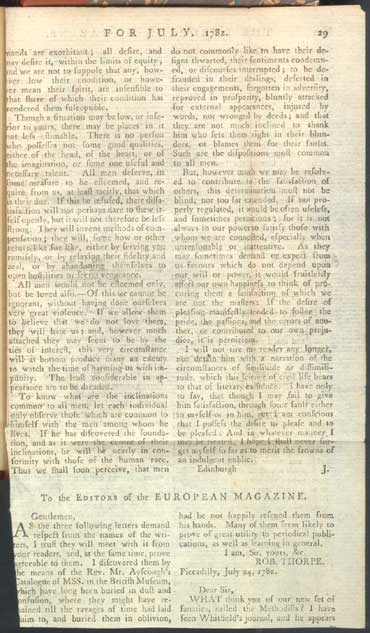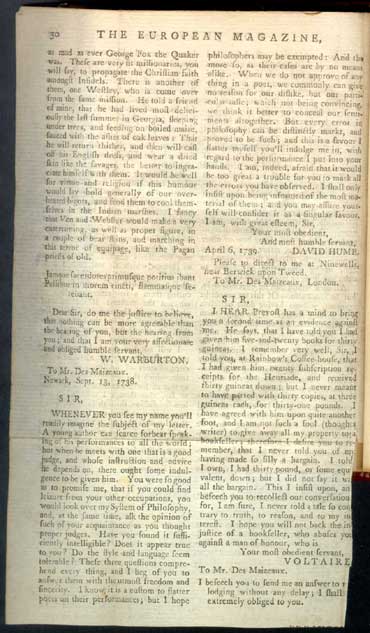|
THE EUROPEAN MAGAZINE
July 1782, pp. 29-30.
To the EDITORS of the EUROPEAN MAGAZINE
Gentlemen,
As the three following letters demand respect from the names of the writers,
I trust they will meet with it from your readers, and at the same time,
prove agreeable to them. I discovered they by means of the Rev. Mr. Ayseough's
Catalogue of MSS< in the British Museum, which have long been buried
in dust and confusion, where they might have remained till the ravages
of time had laid claim to, and buried them in iblivion, had he not happily
rescued them from his hands. Many of them seem likely to prove of great
utility to periodical publications, as well, as learning in general.
I am, Sir, yours, &c.
ROB. THORPE.
Piccadilly, July 24, 1782.
Dear Sir,
What think you of our new set of fanatics,
called Methodists? I have seen Whitefield's journal, and he appears [30]
as mad as ever George Fox the Quaker was. These are very fit missionaries,
you will say, to propagate the Christian faith among the Infidels. There
is another of them, one Westley, who is come over from the same mission.
E told a friend of mine, that he had lived most deliciously the last summer
in Georgia, sleeping under trees, and feeding on boiled maize, sauced
with the ashes of oak leaves: That he will return thither, and then will
cast off his English dress, and wear a dried skin like the savages, the
better to ingraciate himself with them. It would be well for virtue and
religion if this humour would lay hold generally of our overheated bigots,
and send them to cool themselves in the Indian marches. I fancy that Ven
and Webster would make a very entertaining, as well as proper figure,
in a couple of bear skins, and marching in this terror of equipage, like
the Pagan priests of old.
Jamque sacerdotes primusque potitius ibant.
Pellibus in morem cincti, flammasque ferebant.
Dear Sir, do me the justice to believe,
that nothing can be more agreeable than the hearing of you, but the hearing
from you; and that I am your very affectionate and obliged humble servant.
W. WARBURTON.
To Mr. Des Maizeaux.
Newark, Sept. 13, 1738.
SIR,
WHENEVER you see my name you'll readily
imagine the subject of my letter. A young author can scarce forbear speaking
of his performance to all the world; but when he meets with one that is
a good judge, and whose instruction and advice he depends on, there ought
some indulgence to be given him. You were so good as to promise me, that
if you could find leizure from your other occupations, you would look
over my System of Philosophy, and, at the same time, ask the opinion of
such of your acquaintances as you thought proper judges. Have you found
it sufficiently intelligible? Does it appear true to you? Do the style
and language seem tolerable? These three questions comprehend every thing,
and I beg of you to answer them with the utmost freedom and sincerity.
I know it is a custom to flatter poets on their performance; but I hope
philosophers may be exempted: And the more so, as their cases are by no
means alike. When we do not approve of any thing in a poet, we commonly
can give no reason for our dislike, but our particular taste; which not
being convincing, we think it better to conceal our sentiments altogether.
But every error in philosophy can be distinctly markt, and proved to be
such; and this is a favour I flatter myself you'll indulge me in, with
regard to the performance I put into your hands. I am, indeed, afraid
that it would be too great a trouble for you to mark all the errors that
you have observed. I shall only insist upon being informed of the most
material of them; and you may assure yourself will consider it as a singular
favour.
I am, with great esteem, Sir,
Your most obedient,
And most humble servant,
DAVID HUME
April 6, 1739.
Please to direct to me at Ninewells,
near Berwick upon Tweed.
To Mr. Des Maizeaux, London.
SIR,
I HEAR Prevost has a mind to bring you a
second time as an evidence against me. He says that I have told you I
had given him five-and-twenty books for thirty guineas. I remember very
well, Sir, I told you, at Rainbow's Coffee-house, that I had given him
twenty subscription receipts for the Henriade, and received thirty guineas
down; but I never meant to have parted with thirty copies, at three guineas
each, for thirty-one pounds. I have agreed with him upon quite another
foot, and I am not such a fool (though a writer) to give away all my property
to a bookseller; therefore I desire you to remember, that I never told
you of my having made so silly a bargain. I told I own, I had thirty pound,
or some equivalent, down; but I did not say it was the bargain. This I
insist upon, and beseech you to recollect our conversation; for I am sure,
I never told a tale so contrary to truth, to reason, and to my interest.
I hope you will not Back the injustice of a bookseller, who abuses you
against a moan of honour, who is,
Your most obedient servant,
VOLTAIRE
To Mr. Des Maizeaux.
I beseech you to send me an answer to lodging without any delay; I shall
be extremely obliged to you.
The Hume letter appears in J.Y.T. Gregg, The Letters of David Hume
(Oxford: Clarendon Press, 1932), Letter 10, pp. 29-30. Gregg did not know
of this earlier publication of the letter in England.
* * * * * * * * * * * * * * *
Back
|
|


|



